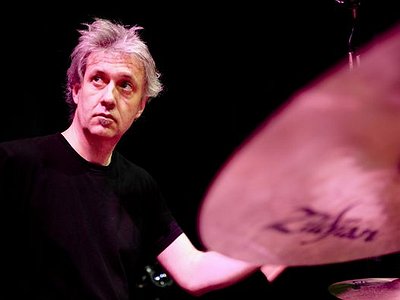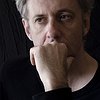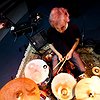Part 1
Name: Tony Buck
Nationality: Australian
Occupation: Drummer/Percussionist/ Guitarist /Musician
Bands/Projects: The Necks / SPILL / Transmit / Peril / Kletka Red
Labels: Fish of Milk / BMG / Northern Spy / monotype / ReR
Musical Recommendations: American composer Jerry Hunt, whose music constantly amazes and fascinates me / Paul Lovens who performs with an energy, creativity and poetry that continues to impress and inspire me ever since first hearing him in 1982 while playing with the Schlippenbach trio in Sydney.
When did you start playing your instrument, and what or who were your early passions or influences?
In the beginning, like many people, there was a gradual attraction to music and playing through the years of my very early childhood.
My interest in music and playing an instrument was the result of a gradual process of experimenting and playing around with pots, pans and toy drums, dancing and writing little songs. I remember really liking the tactile aspect of playing percussion instruments. By the time I was in primary school, I became very interested in writing songs. It was strongly suggested I learn piano as a means of developing this interest, but for me, I somehow had a very strong feeling I needed to play drums. I did however, start playing guitar a little bit and wrote songs on that instrument but not with the seriousness with which I studied and practiced drums.
For most artists, originality is first preceded by a phase of learning and, often, emulating others. What was this like for you? How would you describe your own development as an artist and the transition towards your own voice?
Somehow, from a very early stage of playing and learning, I had the impression I didn’t really ‘do it’ like other people, which at first, and for a long time, made me feel a little insecure and perhaps inferior. It’s hard to say exactly what it was that made me feel different. Perhaps it had to do with the fact I was left handed playing a right handed drum kit, which somehow gave rise to a different emphasis within different parts of the kit, drum fill being somehow ‘backwards’ or there being a slightly different sense of phrasing that came naturally. Perhaps simply a different physical relationship to striking the drum.
Nevertheless this insecurity didn’t stop me from pursuing music really quite seriously. I was interested in trying to learn how to do it like other people did it and tried to emulate others, whether famous players or other kids in my neighbourhood; with more or less success at times.
It took sometime for me to find the positive aspects of having a slightly different way of doing things. Actually, the process of listening to others and appreciating different approaches is something I still engage in. But now, I feel quite good about having and further developing my ‘own voice’. In a sense, it did take quite some time to realise that exploring those qualities that made me different was the most positive direction to take. It’s an ongoing and never ending process.
Tell me about your instrument, please. How would you describe the relationship with it? What are its most important qualities and how do they influence the musical results – and possibly even your own performance?
My main instrument is the drum-kit, and it’s an instrument I have had a long and deep relationship with for a great period of time - since about the age of 5 or 6. I remember receiving a small toy drum-kit as a Christmas present. I’ve played, learned and explored other instruments in my life but the drum-kit remains the major instrument with which I express myself in the context of playing concerts.
The drum-kit as it is, seems to have two contrasting characteristics. It is one unified, cohesive instrument and at the same time a combination of a variety of disparate percussive instruments assembled in a kind of arsenal.
I like the idea of playing with this contrast, sometimes approaching it as a unified instrument- cohesive, balanced; an integrated whole. To play it as an instrumentalist expressing one idea, and yet at other times thinking of it more orchestrally, capitalising on the different layers and timbral options, the extremes of register, from the very highest sounds in the ensemble to the very lowest - the warmest to the most metallic; and playing in a manner more like an arranger, playing different parts against each other, creating counterpoints and accompaniments.
Apart from the expressive qualities I to relate to within the instrument, or combination of instruments that make up a drum-kit, I also have a strong relationship to the tactile sense of touch; the striking of and interacting with the instruments. I have a much greater affinity to using sticks, instruments or other objects than I do to hand percussion for example. I like the feel of the weight and density of objects, their balance and interaction with surfaces. Materials are very important to me as are the ways instruments move, their sense of weight and gravity; the way they move, swing, scrape, caress and collide.
For the last few years I have been playing more and more guitar as well. Initially I started to feel there were certain musical textures, specific harmonic areas and aesthetics that I was finding in guitar playing that were different to those things I had with the drums. After developing these ideas further and playing a lot more, I found that approaches I've explored with the guitar are influencing how I approach playing drums. For instance, while playing drums, I have a general tendency to overlay and play simultaneously contrasting ideas, layering contrasting textures and polyrhythms against each other. From playing guitar more seriously I have discovered that it's really OK to simply play one thing for a while instead of 3 or 4 things at once!
Many artists feel as though, at some point, certain people gave them the ”permission to do certain things”. How was that for you – in which way did the work of particular artists before you “allow” you to take decisions which were vital for your creative development?
There have been many moments in my development where I have benefited from hearing people playing or expressing musical ideas that have suggested that it’s OK to approach things in a certain way that, until then, I had thought were invalid for some reason.
While it is difficult for me to remember too many specific situations or landmark events like this, I feel like there have been many who have helped me on my road to overcoming those fundamental feelings of insecurity I discussed earlier.
I remember when I was starting to play I used to sit and listen to all the overtones one could get from a cymbal and hear how they changed and how I could focus on one or the other, and make transitions between these different sounds. While it was very nice and satisfying for me to do this I couldn’t for the life of me see how this would be interesting enough or interesting for someone else to listen to. I guess slowly hearing more music where the exploration of such subtle harmonic and timbral shifts and a focus on minimal material and processes have, in a sense, given me permission to explore some of these things I was quite naturally drawn to, but somehow felt weren't interesting or smart or good enough. This led to me the idea that there were also plenty of ‘extra-musical’ sounds out there that were also equally valid to draw on, the sounds of cicadas, the birds in Australia, the sea, wind, the natural processes of objects coming to rest.
Hearing the way composer Jerry Hunt uses percussion in his compositions and performances was also an occasion where I felt it was ok to use small and seemingly insignificant little sounds as a texture within a the context of a ‘bigger’ piece.
Of course, there have been many other situations, or the exposure to many other ways of paying music, that have suggested to me that there are many and varied ways to make music. Anything is possible and the only limitation is one’s imagination. This of course isn't limited to the playing of my instrument but also the conception of music in general, the writing and producing of music in every aspect.







